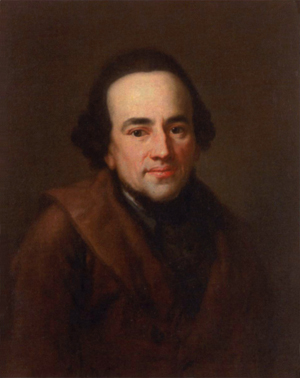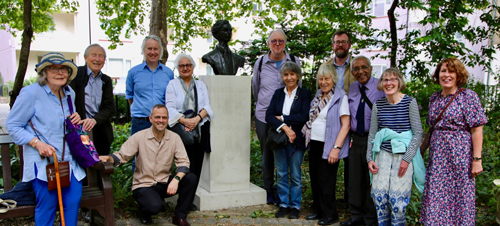
Your complimentary articles
You’ve read one of your four complimentary articles for this month.
You can read four articles free per month. To have complete access to the thousands of philosophy articles on this site, please
News
News: June/July 2022
Mendelssohn Dreams of Enlightenment • Poll Says Public Want Vegan Cars • Bertrand Russell Comes to Bloomsbury — News reports by Anja Steinbauer
Enlightenment Dreams: Moses Mendelssohn Exhibition

Moses Mendelssohn (1729-1786)
Enrolled to attend David Fränkel’s Talmudic seminary, 14 year old Moses Mendelssohn arrived in Berlin in 1743 after a five day walk from his home in Dessau. His determination and enthusiasm for learning stood him in good stead: he grew up to be one of the greatest thinkers of the Enlightenment. We Dreamed of Nothing but Enlightenment is the name of a new exhibition devoted to him at the Jewish Museum in Berlin. The quote is taken from one of Mendelssohn’s letters. Not only does the exhibition contain this and many other letters and manuscripts but also paintings and historical mementos such as Mendelssohn’s reading glasses. The curators have tried to show how Mendelssohn’s ideas are still relevant by including contemporary terminology within the explanations such as ‘networks’, ‘supply chains’, ‘fake news’ and ‘information flood’. The exhibition runs until 11th September 2022. Fun fact: there’s a tenuous connection between this news item and the theme of this issue. Immanuel Kant and Moses Mendelssohn entertained a long literary friendship. They had overlapping philosophical interests and corresponded extensively and enthusiastically. Kant praised Mendelssohn’s book Jerusalem, which argues for freedom of conscience, calling it “an irrefutable book.”
Moscow Philosopher
Alexander Zipko, an 80 year old philosopher from Moscow, recently published a biting critique of the current state of Russian intellectual life in the daily newspaper Nezavisimaya Gazeta. Under Mikhail Gorbachev, Zipko was one of the architects of Perestroika, the attempt to restructure the Communist USSR into a democratic society. After serving in the army, Zipko joined the Institute of Economics at the Russian Academy of Sciences, where he has worked since 1972. The author of more than a dozen books, he also taught in Japan and the US and believes that “the Russian people exist but the Russian nation doesn’t.” Criticising a dominant ideology that values “beautiful myths over reality” and idolises “suffering”, Zipko sarcastically expresses the belief that the sense of value intrinsic to each human life has been lost in his culture.
Vegan Vehicles
Applied ethics in action? The Vegan Society (vegansociety.com) has published a poll showing, they say, that many British drivers would be keen to drive ‘fully vegan’ cars, demonstrating “a strong consumer desire to remove animals from car manufacturing.’’ So your cat can no longer moonlight at the Toyota factory. 75% of the 750 people surveyed were in favour of no longer using any animal products in cars or other vehicles, 70% said they would actively be interested in buying a car free of animal products. Avoiding leather seats and steering-wheel covers is relatively easy. What is harder is that the manufacture of rubber for tires involves stearic acid derived from animal fats, and beef tallow is widely used as an industrial lubricant in the pressing of steel sheets for car bodies.
Bertrand Russell Branches Out
May 18th 2022 was Bertrand Russell’s 150th birthday. Russell was among the foremost philosophers of the 20th century. His most famous work is the massive Principia Mathematica, written jointly Alfred North Whitehead in a valiant but unsuccessful attempt to provide a firm logical basis for mathematics. He was one of the founders of analytic philosophy and later wrote dozens of books on moral and political topics. Bertie himself is no longer around to celebrate birthdays (though he did live to be 97), but members of the Bertrand Russell Society carry on his legacy and discuss his writings through conferences and journals.They held a lively celebration, complete with birthday cake, in Rochester, NY – and this year a group of UK-based members met in London’s Conway Hall to do the same. The latter gathering, organised by Tony Simpson and Alva White, was also the launch event for the new Bloomsbury Chapter of the Bertrand Russell Society.

Members of the newly-launched Bloomsbury Chapter of the Bertrand Russell Society, next to a bust of Russell outside Conway Hall, London.
Gernot Böhme
Gernot Böhme was one of Germany’s best known public intellectuals. After studying mathematics, physics, and philosophy at Göttingen and Hamburg Universities, he worked as a research scientist at the Max-Planck-Institute with the physicist Carl Friedrich von Weizsäcker. From 1977, he taught philosophy at Darmstadt University. In 2012, he described his philosophical efforts over the last few decades as trying to “reclaim what is other to reason for human self understanding.” By ‘other to reason’ he meant “nature, the body, the imagination, desires, emotions’’, aspects of our humanity which he believed to have been ‘othered’ and devalued. Böhme enjoyed collaborating on work with other thinkers in diverse areas. He died on 20 January 2022, at the age of 85.
Joseph Raz
The legal and political philosopher Joseph Raz died in Charing Cross Hospital, London, on 2nd May. Born in 1939 in Haifa, Raz studied law at Hebrew University in Jerusalem. After meeting his future mentor H.L.A. Hart he transferred to Oxford University, where he took a DPhil in philosophy. He spent most of his life as a professor of philosophy of law at Oxford. Following Hart, Raz defended legal positivism, holding that there is no necessary connection between law and morality. Raz went a little further, claiming that the validity of a law never depends upon its morality. He also developed a conception of perfectionist liberalism, arguing that political institutions are justified to the degree that they support the ability of individuals to pursue their goals. Raz received many prizes for his writings, acknowledging the fact that he was one of the most influential theorists in his field.
Sir Alistair MacFarlane FRS
We recently heard the very sad news that a longtime Philosophy Now columnist died last November at the age of 90. Alistair MacFarlane started our Brief Lives column, each installment of which describes the life and ideas of a past thinker. It is still a regular feature today. Alistair was a Scottish engineer with wide-ranging intellectual interests who became a professor while teaching at UMIST. He had a glowing academic career, including being Principal and Vice Chancellor of Heriot-Watt University in Edinburgh, Rector of the University of the Highlands and Islands, and Vice-President of the Royal Society, Britain’s national academy of science.









